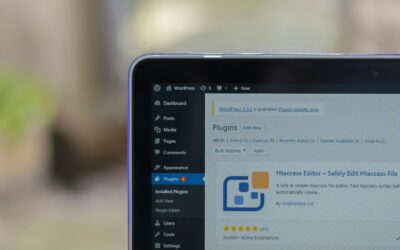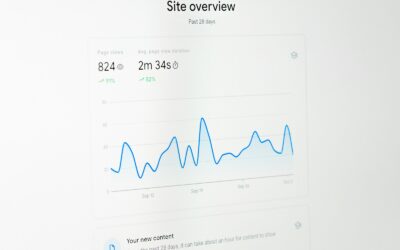Small business owners, if you’re looking to grow your customer base, boost revenue, and make your mark online, then building a strong ecommerce website should be your next priority.
Selecting the best ecommerce website builder is crucial for setting up an ideal platform that meets essential criteria such as ease of use, built-in eCommerce tools, multichannel integrations, and reliable hosting, helping you effectively manage and grow your online presence.
This guide will walk you through ecommerce website development, key components to consider, and expert tips to create a successful online store that your customers will return to time and again.

Photo by Ilya Pavlov on Unsplash
Introduction to Ecommerce Website Development
Ecommerce website development refers to the process of creating online platforms that cater to the buying and selling of goods or services. For small businesses, this typically involves designing user-friendly interfaces, ensuring secure payment gateways, and managing product catalogs effectively.
Whether you’re creating a custom-built website or leveraging off-the-shelf ecommerce platforms like Shopify, BigCommerce, or WooCommerce, building an ecommerce site is a game-changer for businesses looking to sell online and reach a global audience.
Custom-built websites provide unlimited customization possibilities, making them particularly suitable for larger businesses or those with unique requirements. While they come with higher costs and maintenance responsibilities, they offer significant flexibility and personalization options for complex eCommerce projects.
Looking for an experienced Wordpress Development company?

Photo by Lee Campbell on Unsplash
Understanding Ecommerce
What is Ecommerce?
Ecommerce (electronic commerce) is simply the buying and selling of goods and services through online stores. These transactions take place on e-commerce websites, making them the backbone of modern online businesses.
From physical products to digital downloads, e-commerce platforms make it seamless to sell to customers online.
Why is ecommerce essential for small businesses?
- It allows 24/7 sales beyond physical store hours.
- Your online store can reach customers worldwide without geographical constraints.
- Ecommerce tools help streamline the development process, from product listings to payments.

Photo by Annie Spratt on Unsplash
Key Steps to Building an Ecommerce Website
1. Choose the Right Ecommerce Platform
Your ecommerce project begins with selecting the platform that best fits your business needs. Many ecommerce platforms, such as Shopify, WooCommerce, BigCommerce, and Magento, offer a variety of built-in functionalities like SEO tools, web hosting, free themes, and integrations with Google Analytics.
2. Focus on Website Design
A well-designed ecommerce website design can make or break your business. Invest in a responsive design that caters to mobile devices, as most online shoppers browse via their phones. Ensure easy navigation, a clean layout with high-quality images, a professional custom logo, and an intuitive user experience.
Don’t forget to optimize the site for search engines (SEO)—making it easier for potential customers to find your store!
3. Develop a Secure Payment System
A good ecommerce website developer will ensure your site supports secure payment processing by integrating various payment gateways like Stripe, PayPal, or Square. Offering options such as guest checkout features, multiple payment methods, and transparent transaction fees will help build trust with your shoppers.
4. Set Up Shipping and Inventory Management
Your ecommerce store should integrate shipping software that makes delivery options seamless and efficient, enhancing your business operations by streamlining workflows and improving efficiency, whether you offer free shipping or other curated plans for online shoppers.
For inventory management, use systems that keep your stock updated in real time.
5. Content Management and High-Quality Product Descriptions
A strong content management system (CMS) is key to curating product catalogs, descriptions, and visuals. Choosing the right custom domain is crucial for branding and enhancing online security, as it allows access to TLS certificates that protect sensitive customer data.
Write engaging, SEO-friendly product descriptions and include high-quality photos that showcase your items. Keep content updated to reflect new collections and seasonal promotions.
6. Optimize for Mobile Shopping
Mobile optimization is no longer optional. A well-designed mobile site is crucial for enhancing user experience on mobile devices.
Most ecommerce businesses report higher engagement and conversions on a mobile-friendly site. Your portable-friendly design ensures potential customers can shop seamlessly from their phones or tablets.
7. Online Store Setup
Setting up an online store is a crucial step in building an ecommerce website. The process begins with choosing the right ecommerce platform that aligns with your business needs. Popular platforms like Shopify, WooCommerce, and BigCommerce offer various features to help you get started.
Selecting a memorable and relevant domain name is equally important, as it represents your brand online. Additionally, setting up reliable web hosting ensures your site remains accessible to customers at all times.
A user-friendly and responsive design is essential for a successful online store. With the majority of online shoppers using mobile devices, optimizing your site for mobile is no longer optional. A mobile-friendly design ensures that potential customers can easily navigate and shop from their phones or tablets.
Security is paramount in ecommerce. Implementing a secure payment gateway, such as Stripe, PayPal, or Square, protects customer data and ensures a smooth transaction process.
Integrating your online store with social media platforms can expand your reach and attract potential customers, making it easier to promote your products and engage with your audience.
A robust content management system (CMS) is necessary to manage and update your online store’s content efficiently. Regularly updating your site with fresh content, high-quality images, and a custom logo helps create a professional and visually appealing online store.
Optimizing your site for search engines improves its visibility, driving organic traffic and increasing your chances of attracting new customers.
Finally, the online store setup process should align with your overall marketing strategy. This ensures that every aspect of your ecommerce business works together to attract and retain customers, ultimately driving sales and growth.
8. Product Management
Product management is a critical aspect of building a successful ecommerce website. It involves adding and managing products, crafting detailed product descriptions, and uploading high-quality product images.
A well-organized product catalog is essential for making it easy for customers to find what they are looking for, enhancing their shopping experience.
Accurate management of product prices, inventory levels, and shipping details is crucial to avoid any discrepancies that could lead to customer dissatisfaction. Integrating your product management system with your payment gateway and shipping software ensures a seamless transaction process, from purchase to delivery.
Product reviews and ratings play a significant role in building trust and increasing conversions. Encouraging customers to leave reviews can provide valuable feedback and help other shoppers make informed decisions.
Optimizing your product pages for search engines improves their visibility, driving more organic traffic to your site.
A custom product page design can create a unique and engaging shopping experience, setting your ecommerce website apart from competitors. The product management process should align with your overall business model, ensuring that your product offerings and management practices support your business goals.
Regular updates and maintenance are necessary to ensure your product management system runs smoothly and efficiently. Keeping your product catalog up-to-date with new arrivals, seasonal promotions, and accurate stock levels helps maintain customer interest and drive sales.

Photo by Emile Perron on Unsplash
Ecommerce Platforms and Their Features
There are many ecommerce website platforms available. Here are some popular ones and what they offer for small businesses:
- Shopify – Best for beginners who want SEO tools, ease of design, and an all-in-one solution.
- WooCommerce – A great option for businesses that already use WordPress and want custom functionalities.
- BigCommerce – Perfect for scaling businesses with access to advanced analytics and built-in hosting.
Selecting the right ecommerce solution is crucial as it should seamlessly integrate with other business management systems like ERP, OMS, and CRM to ensure operational efficiency. These ecommerce solutions often feature drag-and-drop website builders, pre-made templates, and integrations to enhance your ecommerce store experience.
Marketing Your Ecommerce Website
Creating a beautiful ecommerce website isn’t enough. Without a strong marketing strategy and essential marketing features, even the best ecommerce site won’t attract customers.
- SEO and Digital Marketing: Start with strong SEO foundations, backed by Google Analytics, to identify trending keywords and optimize pages accordingly.
- Social Media Promotion: Engage on platforms like Instagram and Facebook to showcase your products, run promotions, and connect with your audience.
- Email Marketing: Use newsletters to promote exclusive discounts, product launches, and personalized recommendations for your loyal customers.

Photo by ApexDigitalAgency on Pixabay
Payments and Shipping
Make the customer checkout process as seamless as possible by offering trusted payment methods and various shipping options.
Incorporating a guest checkout feature can significantly reduce cart abandonment rates by allowing customers to make purchases without a complicated sign-up process. Payment gateways like PayPal, Stripe, or Square ensure secure transactions and build customer trust.
Packaging and shipping options, including free and expedited shipping, greatly influence the shopping experience. Invest in shipping software that tracks deliveries and offers real-time data to both you and your customers.

Photo by ApexDigitalAgency on Pixabay
Budgeting for Ecommerce Website Development
How much does it cost to build an ecommerce website? Your budget will depend on various factors influencing website pricing, such as the platform you choose, the complexity of the design, integrations, and ongoing maintenance. Each ecommerce platforms offer different things, so make sure you pick the right one for your online retail business.
Understanding these elements is crucial as they can lead to significant variations in the overall cost. Here’s a ballpark split of typical costs for small businesses:
- Platform Subscription: $15–$299 per month depending on the platform and plan.
- Website Hosting – If not included, expect $10–$30 per month.
- Custom Development – Starts at $1,000 for basic customizations; higher for more complex needs.
Launch and Maintenance
Launching an ecommerce website is just the first step in building a successful online business. Ongoing maintenance and updates are necessary to ensure the website remains secure, fast, and user-friendly.
Regular backups and software updates can help prevent data loss and security breaches, protecting both your business and your customers.
Keeping your website’s content and product catalog regularly updated is essential for keeping customers engaged and attracting repeat business. Applying search engine optimization (SEO) techniques consistently improves your website’s visibility, driving organic traffic and increasing your chances of attracting new customers.
Social media marketing and email marketing campaigns are effective ways to attract new customers and retain existing ones. Engaging with your audience on platforms like Instagram and Facebook, and sending out newsletters with exclusive discounts and product launches, can help build a loyal customer base.
Regularly monitoring your website’s analytics and performance helps identify areas for improvement.
A/B testing and user experience (UX) testing can help identify and fix any issues with your website’s design and functionality, ensuring a smooth and enjoyable shopping experience for your customers.
Conducting regular security audits and performance checks is crucial to maintaining a secure and efficient ecommerce website. A reliable web hosting service and ecommerce platform can help ensure your website remains online and accessible to customers at all times, providing a seamless shopping experience.
By focusing on these aspects, you can ensure that your ecommerce website not only attracts customers but also retains them, driving long-term growth and success for your online business.

Photo by Christina Morillo on Pexels
Growing Your Ecommerce Business
Once your ecommerce site is live, your work isn’t done. Owning the entire customer journey by providing a tailored ecommerce experience is crucial to optimize the shopping experience.
Track your site’s performance using Google Analytics, optimize customer data for deeper insights, and adapt your business model as trends evolve. Staying consistent with craftily timed promotions and customer engagement will ensure long-term growth and success.

Photo by ThisIsEngineering on Pexels
Final Thoughts on Building an Ecommerce Site
Creating a successful ecommerce website combines smart technical decisions with a strong marketing and customer-centric approach.
By focusing on building a custom store that meets specific business needs, utilizing platforms like Shopify or website builders with built-in tools, and ensuring responsive design, secure payments, and mobile shopping, small business owners can attract customers and convert traffic into sales.
If you’re ready to take the plunge but need some guidance from an ecommerce developer, we’re here to help. Learn more about our ecommerce web development services today and get one step closer to building your dream custom site.









